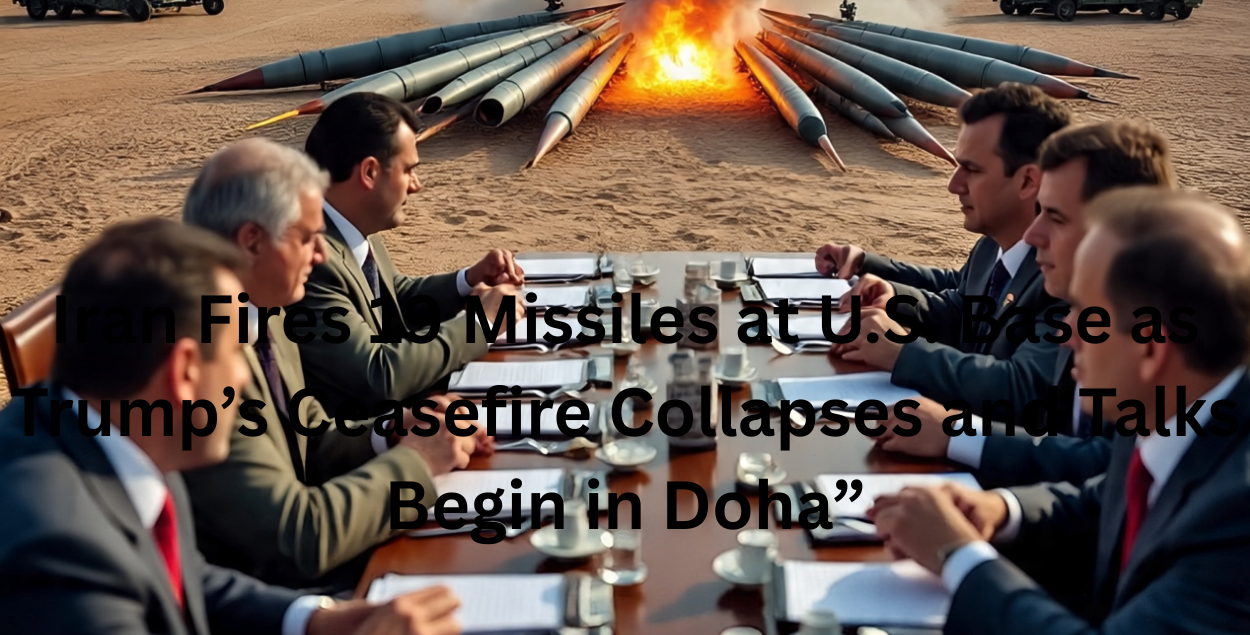FnF News
FNF News | Middle East Crisis | U.S.–Iran Conflict & Diplomacy
Published: June 27, 2025
By: Khadija Khan, Senior Foreign Affairs Editor – FNF
Tehran Fires, Doha Talks: Iran’s Missile Strike on U.S. Base in Qatar Sets the Stage for High-Risk Diplomacy
DOHA — In a move that stunned both regional allies and adversaries, Iran launched 19 ballistic missiles at the U.S.-operated Al‑Udeid Air Base in Qatar on Wednesday night, just as the international community prepared for nuclear negotiations in Doha. While 18 of the missiles were intercepted by Qatar’s U.S.-supported air defense grid, the attack signaled Iran’s intent to set the terms of diplomacy through force—not retreat.
President Trump dismissed the assault as “very weak”, crediting Qatar’s defenses and Tehran’s advance warning for preventing casualties. Yet behind closed doors, U.S. defense officials are treating the incident as a calculated show of strength aimed at shaping the opening posture for next week’s talks.
Precision Meets Symbolism
- The Iranian strike, named “Operation Glad Tidings of Victory,” was reportedly timed to mirror the number of U.S. bombs dropped on Iran’s nuclear infrastructure over the weekend.
- U.S. B‑2 bombers had struck key uranium enrichment sites at Fordow, Natanz, and Isfahan, severely damaging underground facilities.
- According to CENTCOM, the Patriot, NASAMS, Rapier, Roland, and THAAD systems neutralized all but one missile, which landed harmlessly near the base perimeter.
No American or Qatari military casualties were reported, and Qatar condemned the strike, calling it a breach of sovereignty despite Iran’s backchannel warning.
Ceasefire in Pieces
Earlier in the week, Trump declared a “phased ceasefire” between Iran and Israel, but the reality on the ground has rapidly deteriorated.
- Israeli airstrikes resumed in southern Syria within 24 hours.
- Iran responded with both missiles and cyberattacks, targeting Israeli grid systems and U.S. defense contractors.
- Hezbollah, the Houthis, and Iraq’s Kata’ib Hezbollah have all raised operational alert levels.
What was initially framed as de-escalation now looks increasingly like a strategic pause used to reposition forces and recalibrate regional tactics.
Diplomacy from Rubble: The Doha Talks
Despite the chaos, the U.S. and Iran are now scheduled to begin direct nuclear negotiations in Doha next week, with Qatar serving as host and the EU, Russia, and the UN participating as observers.
The agenda includes:
- Immediate caps on uranium enrichment levels
- Potential phased sanctions relief
- Return of IAEA inspectors
- New security assurances to Israel and Gulf states
Iran’s parliament has already suspended IAEA cooperation, demanding recognition of its “peaceful enrichment rights” in exchange for transparency.
Global Watch & Regional Tension
- The USS Gerald R. Ford and USS Carl Vinson carrier strike groups are positioned off Oman and in the Red Sea.
- U.S. Cyber Command elevated its defense posture amid new Iranian-linked phishing and ransomware attempts.
- Russia and China have called for calm, though both nations accuse the U.S. of provoking instability with last week’s bombing campaign.
- Oil markets dropped sharply, with Brent crude falling over 7% as investors bet on a diplomatic breakthrough or controlled conflict.

